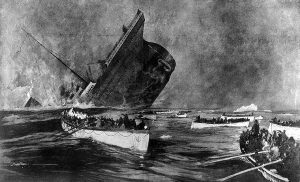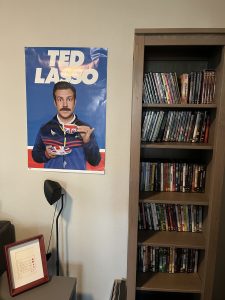2 Why Narrative Film?
(And an Ode to Documentaries)

Narrative film is a category of motion pictures (to use a somewhat old-fashioned term) that tells a fictional or fictionalized story, event, or narrative. A narrative film may also be known as a feature film and is usually contrasted to documentary filmmaking, which is a “non-fiction style of filmmaking that seeks to document some aspect of reality. . . . Documentaries deal exclusively with facts and real-life events. The main purpose of a documentary is to inform and educate.”[1] Both narrative film and documentaries tell a story, but they differ in the methods used to tell that story. Some narrative filmmakers, like Martin Scorsese, employ a “documentary style” in their storytelling; here the renowned director discusses his blurring of the two styles:

Source: Wikimedia Commons, Public Domain.
Narrative film can be divided into a variety of sub-genres, such as western, action, biopic, musical, comedy, romantic comedy (rom-com), drama, horror, science fiction, film noir, etc. Feature films may be based on real events, but instead of actual footage of those events, provide dramatic re-creations with actors in roles – and may take considerable “creative license” in the re-telling. Titanic, for example, is set against the backdrop and actual historical event of the sinking of the R.M.S. Titanic in 1912, but the main characters, Jack and Rose, are fictional. Narrative films usually begin with a written screenplay, which is then translated to the screen by the production team through acting, directing, design, photography, cinematography, editing, and other techniques.

CC BY-SA 2.0
Certainly, documentary filmmakers have taken up climate change as their subject, sometimes in extremely powerful and impactful ways. The first documentary to mention climate change was The Unchained Goddess in 1958, part of an educational film series overseen by popular feature film director Frank Capra (he helmed It’s a Wonderful Life, for example). But it took nearly fifty years for climate change awareness to become a relatively common subject of documentaries, thanks in large part to An Inconvenient Truth (2006), written by former United States Vice President Al Gore and directed by Davis Guggenheim. The ground breaking film follows Gore on a lecture circuit, during which he presented a factual, and often alarming, analysis of climate change causes, effects, and potential solutions. An Inconvenient Truth became both a critical and commercial success, winning the Best Documentary Feature at the Academy Awards (and at practically every other awards) while also becoming one of the highest-grossing documentaries of all time.
Numerous documentaries focused on the environment and climate change followed. Climate Change: The Facts (2019) is an excellent, one-hour primer on the phenomenon, with David Attenborough, a popular narrator of nature documentaries, lending his authoritative voice. Before he starred in Don’t Look Up, Leonardo DiCaprio spent three years traveling the world to explore the impact of climate change, capturing footage with co-creator/producer Fisher Stevens for Before the Flood (2016). The film’s website describes it thus:
[DiCaprio] goes on expeditions with scientists uncovering the reality of climate change and meets with political leaders fighting against inaction. He also discovers a calculated disinformation campaign orchestrated by powerful special interests working to confuse the public about the urgency of the growing climate crisis. With unprecedented access to thought leaders around the world, DiCaprio searches for hope in a rising tide of catastrophic news.[2]
Other notable documentaries include:
- Climate Refugees (2010)
- Chasing Ice (2012)
- Earth: The Operator’s Manual (2012)
- The Merchants of Doubt (2014)
- Chasing Coral (2017)
- Thank You for the Rain (2017)
- 2040 (2019)
- Cooked: Survival by Zip Code (2019)
I Am Greta (2020) is one of the most recent entries in this documentary history. It captures a leading voice, Greta Thunberg, of a younger generation pleading for change to preserve the planet and this generation’s (and those following) future. The film’s chronicle of one passionate and committed teen activist’s work to take action to address climate change – in the face of so many adults who fail to – is inspiring.
These documentaries are extremely important resources for communicating credible information about climate change and through that information hopefully raising awareness, shifting perspectives, and even spurring action to do something to address the problem. Some of these even offer science-based solutions. And as films like An Inconvenient Truth prove, documentaries can have significant reach to wide audiences. But taken as a whole, they simply don’t have the potential for the kind of reach and impact that narrative/feature films can have. This is one reason for the focus of this text.

I also love a certain recent streaming series?
The other is a personal one for me: I simply prefer to watch narrative films over documentaries. My dvd, blu-ray, and digital collection of hundreds of films includes just two documentaries. (I also tend to prefer reading fiction over non-fiction in my personal time.) Even if the films are based in real life, even if they lean toward “escapism” (such as musicals and rom-coms), I find the use of imagination to tell a story to be exciting, compelling, and inspiring. While truth may indeed be stranger than fiction, narrative film can creatively envision – and depict – a world without interventions into the problems caused by climate change and then can imagine – and depict – potential solutions not yet realized by science.
So with recognition of the importance and impact of documentaries to raise awareness of climate change – and spur action to mitigate or even prevent it – here I will explore the narrative films that attempt to do the same through different, imaginative and creative methods. Thank you for going on this journey with me!

KNOWLEDGE CHECK
Video
Martin Scorsese: Documentary Vs. Narrative: https://youtu.be/GJtBd0VdImw
- MasterClass (September 24, 2021). Learn About Documentary Filmmaking: How to Research a Documentary Film With Tips and Advice From Ken Burns. Retrieved July 16, 2022. ↵
- Before the Flood: About the Film. Retrieved July 18, 2022. ↵
